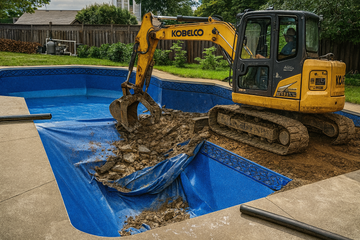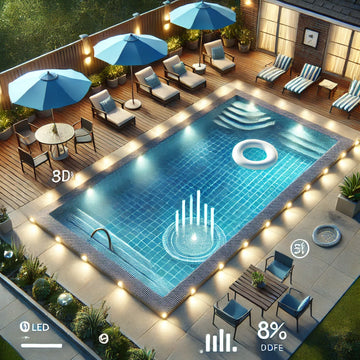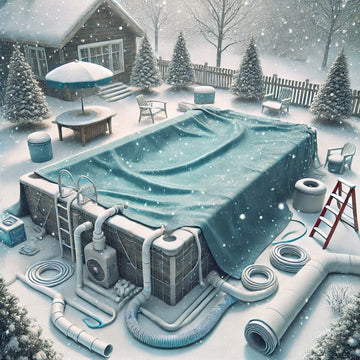A LOOK AT WINTERIZING IN-GROUND POOLS AND WHY YOU SHOULD HIRE THE PROS
The key to the longevity of your pool is proper winterization. This crucial process is done to ensure your pool is properly protected and can be used in the upcoming pool season.
Proper pool closing protects your pool from both costly structural and cosmetic damage. That’s why it’s important to follow each step and use high-quality products. If you don’t have the time or resources, consider hiring the pool closing pros to ensure your pool is winterized properly and can be used for years to come.
Here are pool safety tips to keep your pool protected from damage this winter.
WHAT’S WINTERIZING AND WHAT DOES IT DO?
Winterizing is a form of pool maintenance you must do each fall when closing your pool during the off-season.
It involves:
- Thoroughly cleaning the pool;
- Balancing the water;
- Adding winterizing chemicals;
- Draining and/or storing equipment, such as the pump, filter, and heater;
- Lowering the water line as needed;
- Removing and storing pool accessories—e.g. ladder, slide, and diving board;
- Blowing out the pool pipes;
- Installing a safety pool cover (as required; tarp covers are not recommended).
A proper winterization also means checking for any damage and making repairs before the cold weather hits. This avoids larger problems that can cost you more in the long run.
Proper winterization ensures your pool won’t sustain damage from freezing temperatures in the winter. It also keeps your pool cleaner throughout the winter months so you won’t have as much work to do come spring.
If left untreated, your pool walls might stain and the water could be green with algae blooms next spring. And when water freezes in pools, it can cause serious damage to a pool’s plumbing, equipment, lining, and structure if not properly winterized.
WHAT HAPPENS IF THE POOL FREEZES?
If your pool freezes before you took the steps to winterize it, the water will expand and possibly damage your pool circulation system, tiles, skimmer, filter, and plumbing.
The most common damage from frozen water is cracking. If any of your pool’s structure, lines, plumbing, or equipment cracks in the winter, you will have a hefty pool repair bill when it’s time to open your pool next spring.
If your pool still isn’t winterized, act fast and call the pool closing pros so you can avoid any issues with freezing.
GET YOUR POOL WINTERIZEDHOW TO KEEP THE POOL AND AREA CLEAN IN THE WINTER
The best way to keep your pool clean in the winter is by installing a safety pool cover. A safety pool cover will prevent snow and debris from getting in your pool, building up, causing damage, and making your pool dirty. It will also prevent animals from getting into your pool.
It is not recommended to install a tarp cover as it does not offer as much safety, support, and security from wildlife entering your pool.
It’s also important to keep your pool deck and surrounding area clear of leaves and other debris.
Cleaning your pool, balancing the water, and adding winterizing chemicals will also help keep your pool clean throughout the winter.
Winterizing chemicals include:
- Algaecides (to prevent algae blooms);
- Enzymes (to break down stain-causing contaminants);
- Rust protectors;
- Stain sequestrants; and,
- Shock treatments to kill bacteria.
IS IT NECESSARY TO DRAIN THE POOL IN THE WINTER?
No. You should leave as much water in your pool that it reaches a standard height and only lower your pool water level to below the skimmer and returns. Don’t drain your pool completely. Leaving water in your pool actually protects your pool from damage in the winter.
If you have a vinyl pool liner, the water will keep the liner moist and prevent it from drying out and cracking. The water will also protect the liner from tears caused by debris and ice.
HOW TO PROTECT THE POOL COVER
Keep an eye on your pool cover over the winter. If you notice snow and ice building up, clear off the snow with a roof rake so the cover doesn’t sink into the pool. With safety pool covers, it’s important to ensure there is enough water in the pool to prevent damage to the cover. Your water level should be no lower than 12 inches from the deck.
To clear off dirt and debris, use a hose and shop vac.
OTHER PROTECTION TIPS FOR THE OFF-SEASON
Along with keeping your pool cover clean in the winter, check your pool’s water chemistry every couple of months in the off-season. Add chemicals if needed and also consider adding a mid-winter algaecide to prevent algae growth.
WHAT DAMAGE IS DONE IN THE WINTER?
The biggest threat to pools in winter is freezing water, which will damage the pool structurally and cosmetically.
CRACKED TILES
If your pool’s surface water freezes, it will expand and risk cracking the pool tiles. So if you have a tile-lined pool (gunite pools), you must drain the water below the tile line.
BROKEN SKIMMERS & FILTERS
Since pool skimmers and filters are typically made of plastic, these can crack easily in winter with frozen, expanded pool water. So to avoid these components from cracking and needing replacement come spring, and make sure the skimmer is filled with foam. Empty the filter by removing the blug and adjusting the leaver to “winterize”.
TORN VINYL LINERS
Frozen surface water poses a threat to vinyl liners, especially if there’s a leak in the pool and the water level becomes too low. If thick sheets of ice on the surface break and sink down, the ice sheets can tear the liner. So it’s important to inspect your pool for leaks and make the necessary repairs before pool closing.
BURST PIPES
Water left inside your pool’s pipes will freeze, expand, and risk bursting the pipes over the winter. This is probably the most serious and costly type of damage caused by frozen water.
To properly drain and winterize your pipes, you must blow out the lines using a compressor, professional pool blower or a shop vac connected to all lines typically at the filter, pump, or skimmer. And for an extra safety measure, you can also add anti-freeze to the pipes.
WHY IT’S BEST TO HIRE THE PROS
Proper pool closing is a process. You can’t cut corners and skip any steps. So if you’re in doubt about how to properly close your pool this fall, leave this work to the pros.
Get it done right with proper inspection, repairs, and professional winterization so your pool will survive the winter months. From pool leak detection and repairs to safety cover installations, pool closing experts will take the necessary measures to make sure your pool is damage-free and ready to use come the summer.




